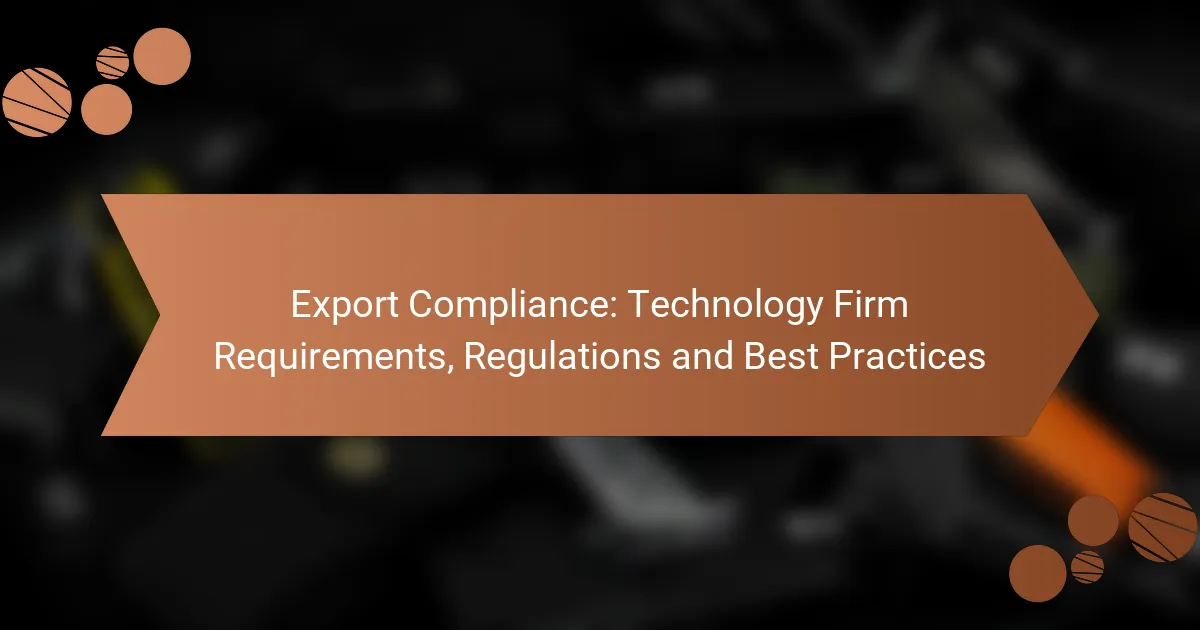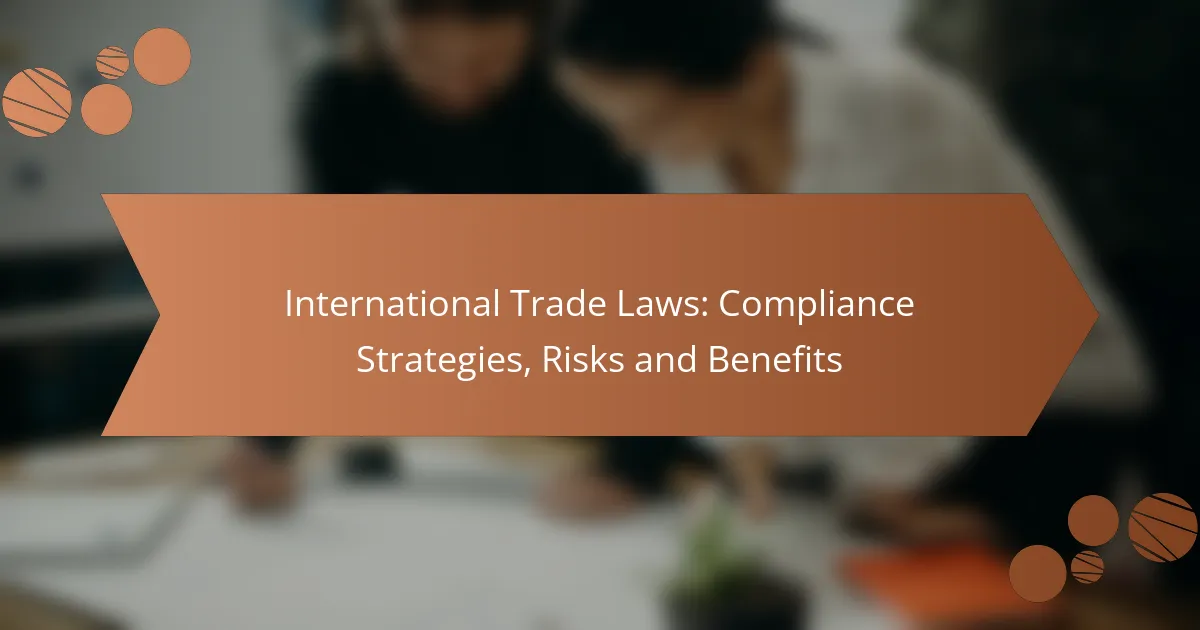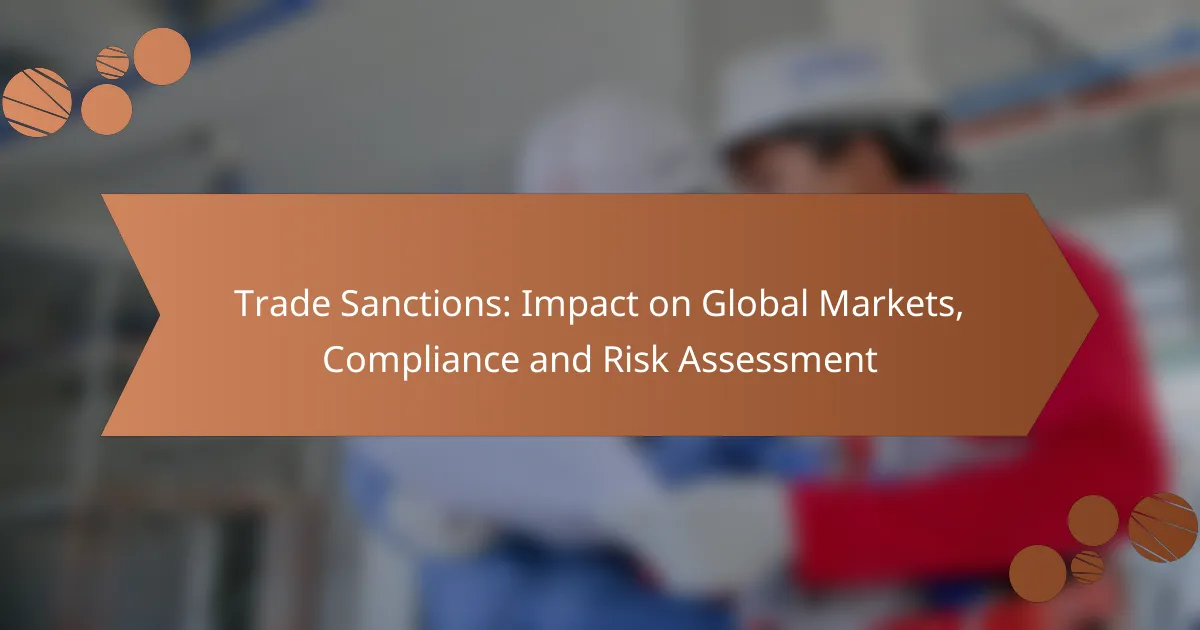Export compliance is crucial for technology firms in the US, as they must navigate a complex landscape of regulations including the Export Administration Regulations (EAR), the International Traffic in Arms Regulations (ITAR), and OFAC sanctions. To maintain compliance, companies should implement robust programs, conduct regular audits, and provide employee training on these critical regulations. Adopting best practices such as thorough documentation and utilizing compliance software can further safeguard against potential legal risks associated with exporting technology products and services.
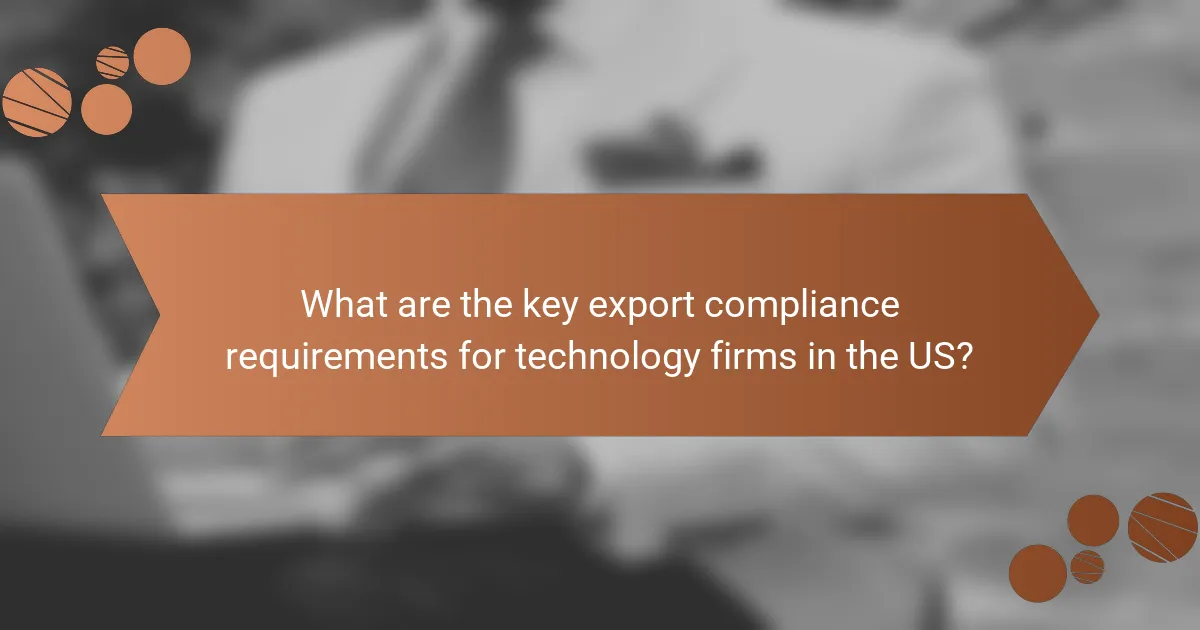
What are the key export compliance requirements for technology firms in the US?
Technology firms in the US must adhere to several key export compliance requirements to ensure they are not violating laws that govern the export of goods, services, and technology. These regulations include the Export Administration Regulations (EAR), the International Traffic in Arms Regulations (ITAR), and the Office of Foreign Assets Control (OFAC) sanctions, each with specific guidelines and implications for businesses.
Export Administration Regulations (EAR)
The Export Administration Regulations (EAR) control the export of dual-use items, which are products that can be used for both civilian and military applications. Technology firms must determine whether their products fall under the EAR and, if so, whether they require an export license based on the destination country and end-user.
To comply with EAR, firms should conduct a thorough classification of their products using the Commerce Control List (CCL). This involves assessing the technical specifications and intended use of the items. Regular training for staff on EAR compliance is also essential to avoid inadvertent violations.
International Traffic in Arms Regulations (ITAR)
The International Traffic in Arms Regulations (ITAR) govern the export of defense-related articles and services. Technology firms dealing with military applications must register with the State Department and ensure that they have the necessary licenses for exporting controlled items.
ITAR compliance requires firms to implement strict controls over the dissemination of technical data related to defense articles. This includes maintaining records of exports and ensuring that employees handling sensitive information are properly trained in compliance requirements. Non-compliance can result in severe penalties, including fines and loss of export privileges.
Office of Foreign Assets Control (OFAC) sanctions
The Office of Foreign Assets Control (OFAC) administers and enforces economic and trade sanctions against targeted foreign countries and regimes. Technology firms must screen their transactions and customers against OFAC’s list of sanctioned individuals and entities to avoid engaging in prohibited activities.
To ensure compliance with OFAC sanctions, firms should implement robust due diligence procedures, including regular audits of their customer databases and transaction records. It is critical to stay updated on changes to OFAC regulations, as violations can lead to significant legal repercussions and financial losses.
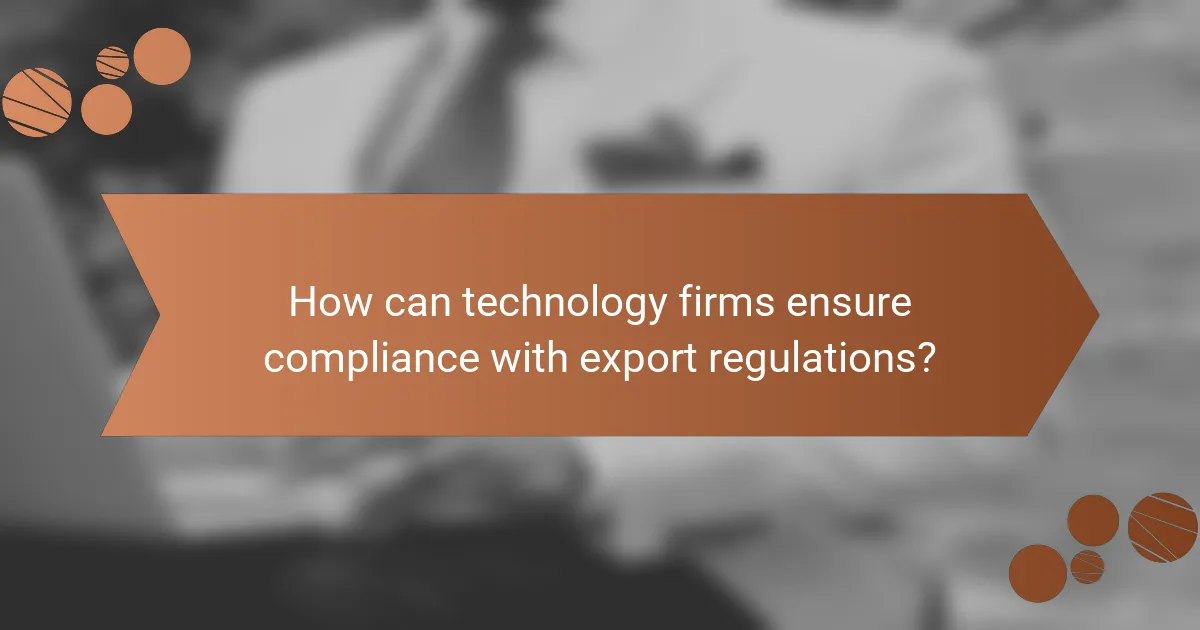
How can technology firms ensure compliance with export regulations?
Technology firms can ensure compliance with export regulations by establishing robust compliance programs, conducting regular audits, and training employees on relevant regulations. These steps help mitigate risks associated with non-compliance and ensure adherence to legal requirements.
Implementing compliance programs
Implementing a compliance program involves creating a structured framework that outlines policies and procedures for adhering to export regulations. This includes identifying applicable laws, such as the Export Administration Regulations (EAR) in the U.S., and establishing protocols for classifying products and technologies.
Firms should designate a compliance officer or team responsible for overseeing the program, ensuring that all employees understand their roles. Regular updates to the compliance program are essential to adapt to changing regulations and business practices.
Conducting regular audits
Regular audits are crucial for assessing the effectiveness of compliance programs. These audits should evaluate processes related to export documentation, product classifications, and transaction records to identify potential gaps or areas for improvement.
Firms can schedule audits quarterly or bi-annually, depending on their size and complexity. Utilizing external auditors can provide an unbiased perspective and help firms stay aligned with best practices in export compliance.
Training employees on compliance
Training employees on compliance is vital for fostering a culture of awareness and accountability. Regular training sessions should cover key regulations, company policies, and the consequences of non-compliance.
Consider implementing a mix of in-person workshops and online training modules to accommodate different learning styles. Providing real-world scenarios and case studies can enhance understanding and retention of compliance concepts among employees.

What are the best practices for export compliance in technology?
Best practices for export compliance in technology involve thorough documentation, the use of compliance software, and engaging legal counsel. These strategies help ensure adherence to regulations and mitigate risks associated with exporting technology products and services.
Documenting export transactions
Accurate documentation of export transactions is crucial for compliance. This includes maintaining records of invoices, shipping documents, and export licenses. Companies should keep these records for a minimum of five years, as required by many regulatory authorities.
Implementing a standardized documentation process can streamline compliance efforts. For example, using checklists for each transaction can help ensure that all necessary documents are collected and reviewed before shipment.
Using compliance software solutions
Compliance software solutions can significantly enhance a technology firm’s export compliance efforts. These tools often include features for tracking shipments, managing licenses, and screening customers against restricted party lists.
When selecting compliance software, consider factors such as user-friendliness, integration capabilities with existing systems, and support for relevant regulations. Many firms find that investing in such software reduces manual errors and improves efficiency in compliance processes.
Engaging legal counsel for guidance
Engaging legal counsel with expertise in export compliance is a best practice for technology firms. Legal advisors can provide insights on complex regulations and help navigate the intricacies of international trade laws.
Regular consultations with legal experts can also assist in developing internal compliance policies and training programs. This proactive approach helps mitigate risks and ensures that the firm stays updated on any changes in export regulations that may affect operations.
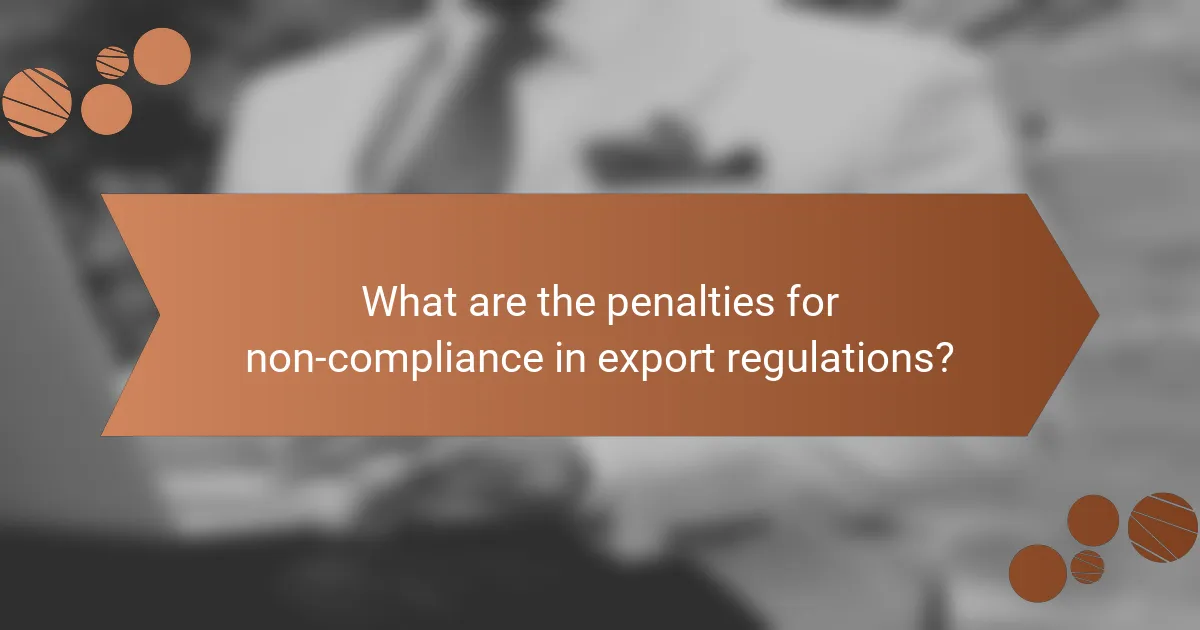
What are the penalties for non-compliance in export regulations?
Penalties for non-compliance in export regulations can be severe, impacting both organizations and individuals. These penalties may include substantial fines, loss of export privileges, and even criminal charges, depending on the severity of the violation.
Fines and monetary penalties
Fines for export compliance violations can vary widely, often ranging from thousands to millions of dollars. The specific amount typically depends on the nature of the violation and the governing regulations, such as the Export Administration Regulations (EAR) or the International Traffic in Arms Regulations (ITAR).
For instance, a company that fails to obtain the necessary licenses for exporting controlled technology might face fines that can reach into the low tens of millions of USD. It’s crucial for firms to assess their compliance regularly to avoid these financial repercussions.
Loss of export privileges
Non-compliance can lead to the revocation of a company’s export privileges, effectively barring them from conducting international trade. This loss can severely impact business operations, leading to significant revenue declines.
In some cases, companies may be placed on a denied parties list, which prohibits them from exporting to specific countries or entities. To mitigate this risk, firms should implement robust compliance programs and conduct regular audits of their export activities.
Criminal charges against individuals
Individuals involved in export compliance violations may face criminal charges, which can result in imprisonment and hefty fines. These charges are often pursued in cases of willful misconduct or gross negligence.
For example, an employee knowingly exporting restricted technology without proper authorization could be charged with a felony, leading to significant legal consequences. Companies must ensure that their staff are trained in compliance to prevent such scenarios and protect both the individuals and the organization.
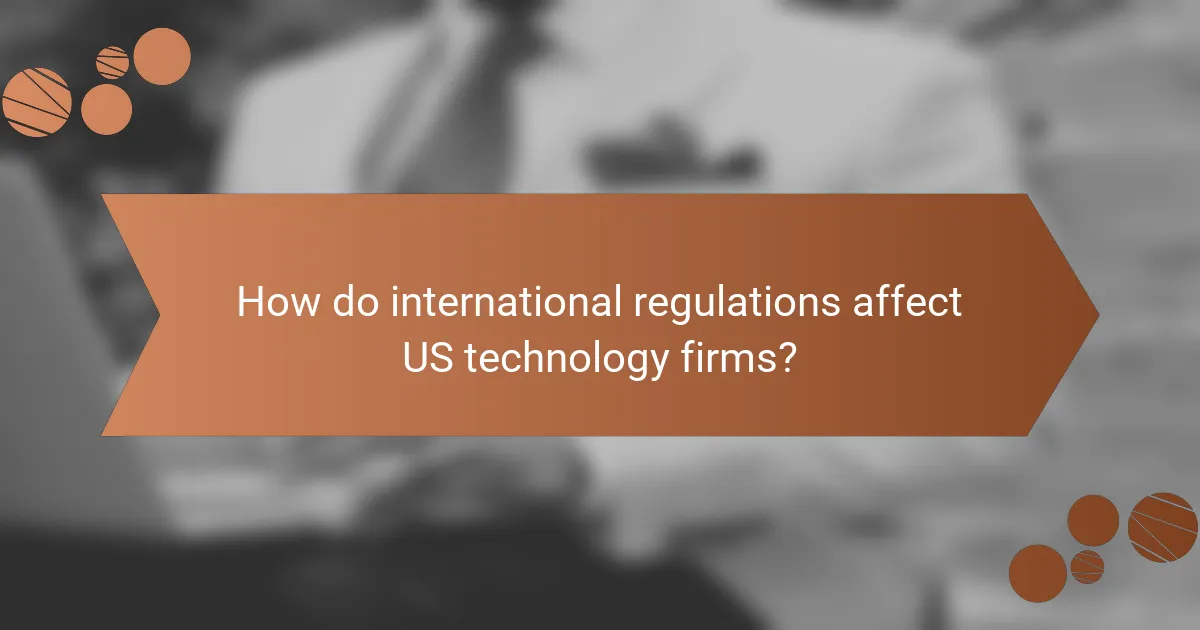
How do international regulations affect US technology firms?
International regulations significantly impact US technology firms by dictating how they can operate in foreign markets. Compliance with these regulations is essential to avoid penalties and ensure smooth business operations across borders.
Impact of foreign regulations
Foreign regulations can impose various requirements on US technology firms, including data protection, product standards, and trade restrictions. For example, firms may need to adapt their products to meet local safety standards or modify their data handling practices to comply with privacy laws.
Failure to comply with these regulations can lead to fines, product recalls, or bans from operating in certain markets. Therefore, understanding and integrating these regulations into business strategies is crucial for success in international markets.
Compliance with EU GDPR requirements
The General Data Protection Regulation (GDPR) is a key regulation affecting US technology firms operating in the European Union. It mandates strict guidelines on data privacy and protection, requiring companies to obtain explicit consent from users before processing their personal data.
US firms must implement robust data protection measures and ensure transparency in their data handling practices. Non-compliance can result in hefty fines, potentially reaching up to 4% of annual global revenue, making adherence a top priority for businesses targeting EU customers.
Variations in export controls by country
Export controls vary significantly from country to country, affecting how US technology firms can sell their products internationally. Some nations have stringent regulations on sensitive technologies, while others may have more lenient policies.
For instance, countries like China and Russia have specific restrictions on the export of certain technologies, requiring firms to obtain licenses before proceeding. It is essential for US firms to research and understand the export control laws of each target market to avoid legal issues and ensure compliance.
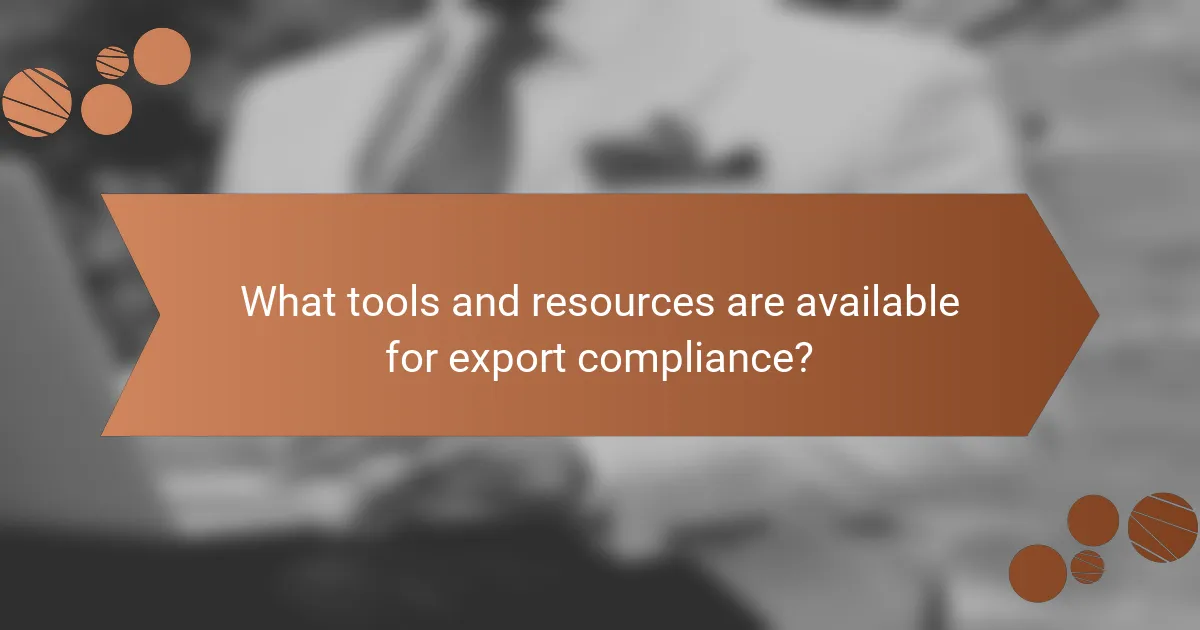
What tools and resources are available for export compliance?
Various tools and resources can assist technology firms in achieving export compliance. These include specialized software, government guidelines, and industry best practices that help navigate complex regulations.
Export compliance management software
Export compliance management software streamlines the process of ensuring adherence to export regulations. These tools often include features for screening customers, managing documentation, and tracking shipments to ensure compliance with local and international laws.
When selecting software, consider factors such as user-friendliness, integration capabilities with existing systems, and the ability to stay updated with regulatory changes. Popular options include software from providers like SAP, Oracle, and specialized firms focused on compliance solutions.
Government resources and guidelines
Government resources are crucial for understanding export compliance requirements. Agencies such as the U.S. Bureau of Industry and Security (BIS) and the European Commission provide guidelines, regulations, and updates that are essential for firms engaged in international trade.
Utilizing these resources involves regularly checking official websites for updates, attending webinars, and participating in training sessions. Firms should also consider subscribing to newsletters from relevant government agencies to stay informed about changes that could impact their operations.
